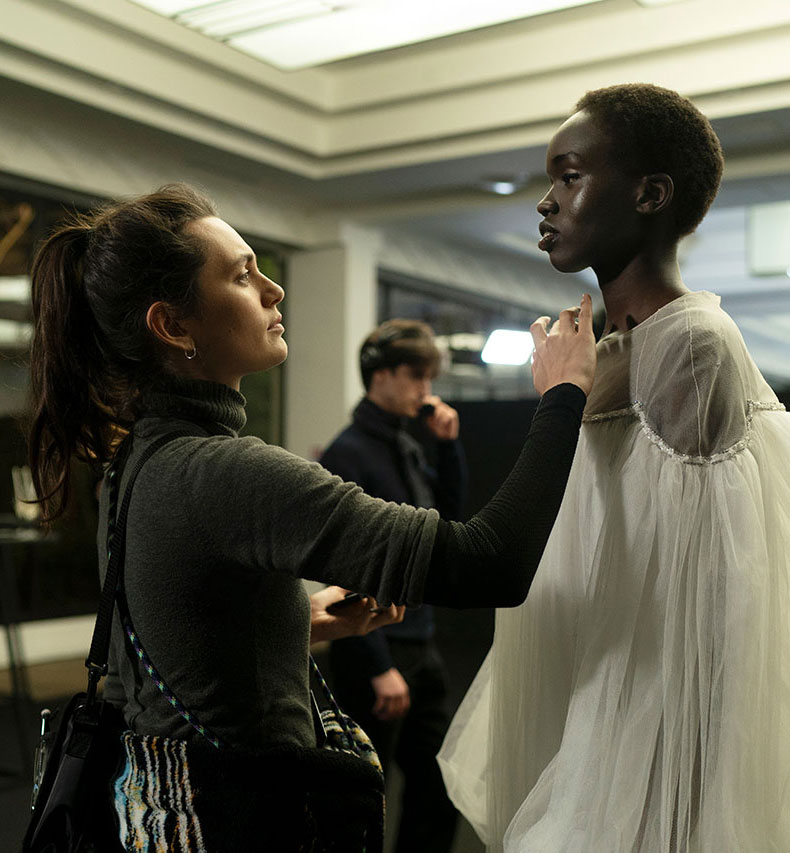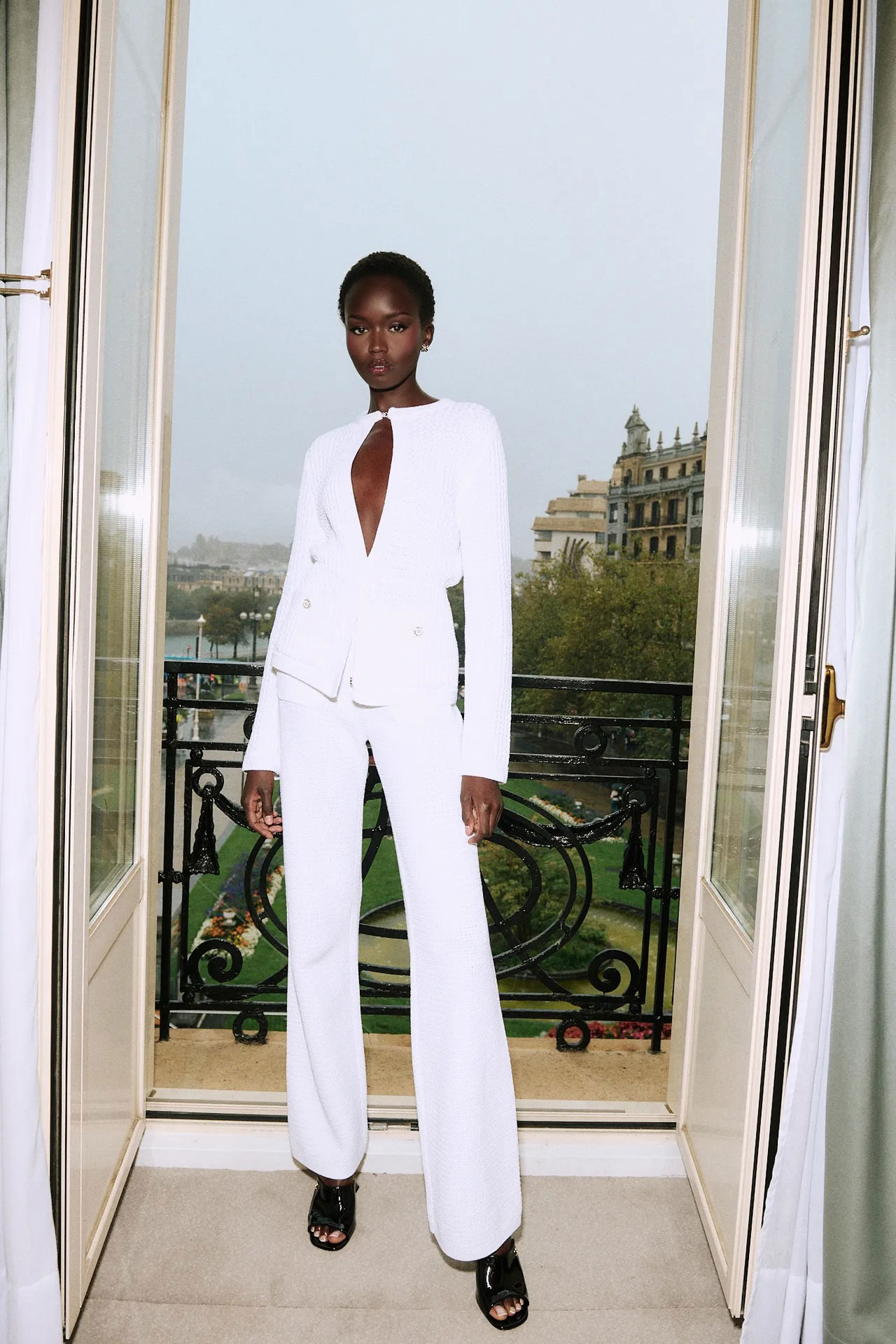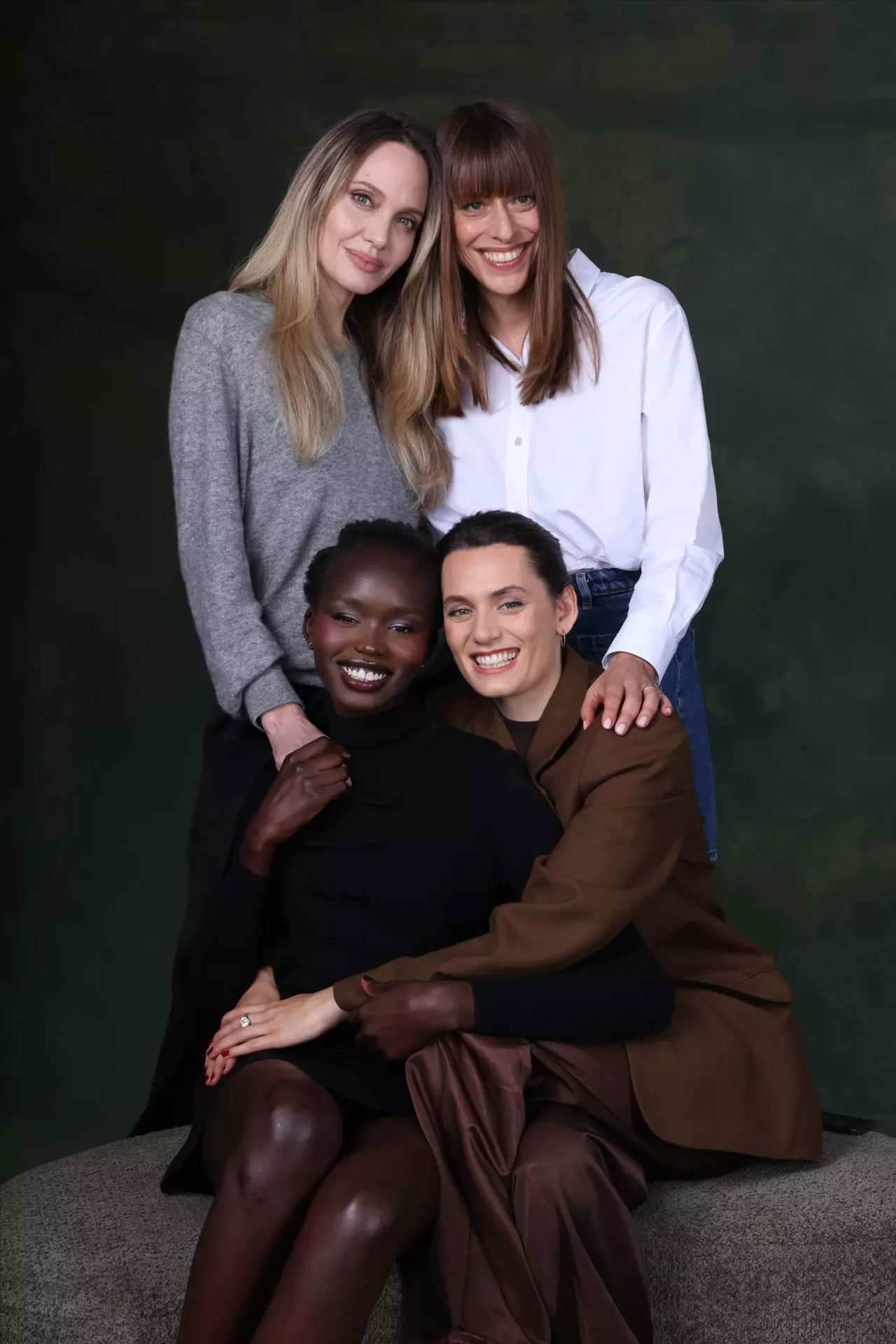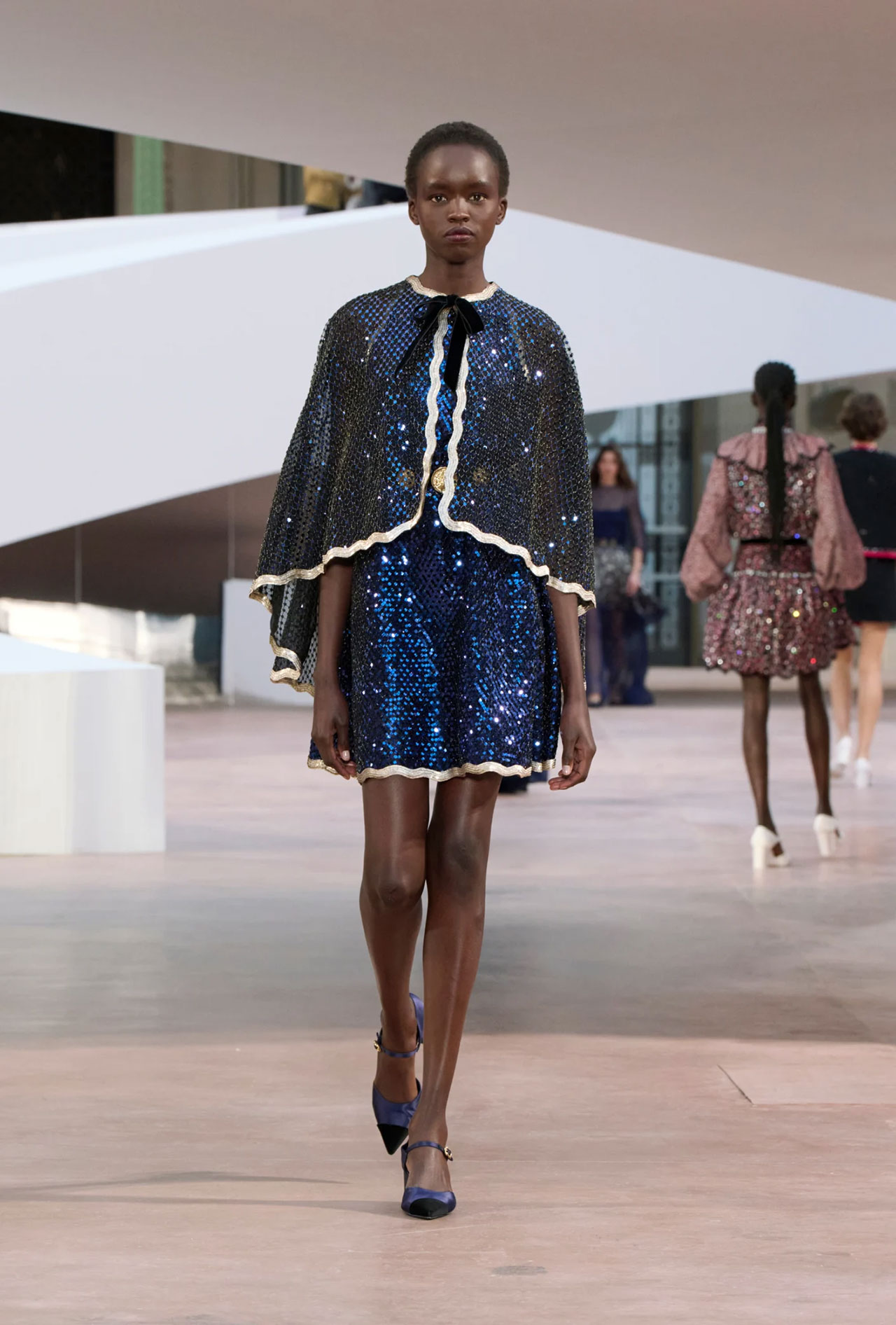
Ella Rumpf & Anyier Anei | Image courtesy of EWG
At Chanel’s Spring 2024 Couture show, Anyier Anei’s life took an unexpected turn. The South Sudanese model, who entered the industry in 2022 and made her debut at Versace’s F/W 22 show, has since fronted campaigns for Balmain, Fendi, and Rhode. However, what she didn’t realize at the time was that the runway would soon lead her into a new creative chapter: film. During that same Chanel couture show, director Alice Winocour noticed Anei and later selected her out of more than 400 models to play “Ada” in her new film Couture, that follows the intertwining lives of three women in Paris. Among them are Maxine played by Angelina Jolie, a filmmaker in her forties facing a breast cancer diagnosis; Ada (Anei), a rising model escaping a predetermined future in South Sudan; and Angèle (Ella Rumpf), a makeup artist navigating the backstage chaos of fashion week. Beneath the spectacle of couture, their stories reveal quiet resilience and the unspoken solidarity shared across professions, cultures, and continents. For Anei, the experience was both personal and groundbreaking. “I didn’t grow up seeing people like me, and specifically South Sudanese women, in the entertainment world,” she shared. “Having the honor of being on this kind of platform really motivated me to give my best to the role. I wanted to bring Ada to life as truthfully as possible, not perfectly, but to the best of my abilities. Because to me, it’s not just about representing myself. It’s about representing so many others who can relate to my story.” Models.com caught up with the emerging actor to discuss her first-ever role, the personal connection she found in Couture, and what is next for her in her acting journey.

Anyier Anei | Image courtesy of EWG
What drew you to the film, Couture, and how did you feel stepping onto the film set for the first time?
It was destiny. I met Alice (Winocour), the director, a few times throughout the year before she officially approached me in October about the movie. She actually met me backstage at Chanel, just randomly, and started asking me questions about South Sudanese girls. She mentioned she was making a movie and asked for my email. I gave it to her, and she sent me an email, but I never responded because I thought it was just someone trying to get me into a movie. I was like, “I’m not an actress.” Then a few months later, in June, my agent called and said, “You have to rush to Chanel for VIP fittings.” I went in for the fittings, and it turned out that the looks I was trying on were the ones I’d be wearing in the movie. In October, my agent called again and said, “Hey, I have a script for a movie for you.” I remember saying, “What makes you think I can do a French movie?” and she just said, “Give it a shot.” So I took the script, learned it as quickly as I could, and when I walked into the room, I realized it was the same woman I’d met back in January. That moment really pulled me in. Another reason I felt connected to the project was that Alice (Winocour) ended up tweaking the whole script to reflect parts of my own story. In many ways, it felt like I was telling my own story, which made me even more drawn to it. As for how it felt stepping on set, it was exciting, but also really scary. I had no background in performance or acting, and coming from modeling, you’re used to being beautiful in silence. So the whole idea of speaking and embodying a character was completely new to me.
As this was your first role, so how did you prepare for it in terms of learning the lines?
I’d say I’m a pretty fast learner, so it didn’t take me long to get the lines down. This film is a project I take a lot of pride in, and I was very dedicated to it. I went out of my way to learn and do everything I could. I had a coach on set who helped me with the French parts of the script, but she always gave me space to do my thing. Just having that trust really allowed me to maximize my potential.
Ada is described as “a rising model escaping a predetermined future in South Sudan.” As you are South Sudanese, how did you connect with her story on a personal level?
It’s a very personal story. Ada’s life is laid out for her in a safe, traditional way; she’s sent to school, and after that, she’s expected to get married or follow a conventional path to success, but she goes out of her way to chase a light she sees at the end of a very foggy tunnel. She can’t see everything clearly, but she believes in that light and follows it with so much strength and courage. She’s a risk-taker, immersing herself in the chaos of the fashion world even though she’s completely new to it. She knows no one, she’s risking her safety, lying to her parents, and potentially breaking family ties, all to chase her dreams. I connect with that story so much because that’s my reality, too.
How did your own upbringing and identity shape the way you approached Ada?
I’ve always been a very strong and independent person. Growing up in a big family, you always had to find your own way through things. I went out of my way to find scholarships to further my education, and I consistently pursued my goals. One of the things that helped me through all those phases of my life is that I don’t really have a fear of making mistakes. I’m always open to trying something new. No matter what happens, even if I fall, I’ll always dust myself off and keep going. One of the things that stands out the most about Ada, and something I really wanted to portray, is that she’s a risk-taker. I mention that a lot in the film because it’s so true, she throws herself into a world she knows nothing about, and while she’s a bit naïve, she’s also very raw and genuine in her actions. You can see that she’s young, she’s only 18, so of course she doesn’t know everything yet. She’s navigating a new culture, she knows no one, she’s lying to her parents, but she’s very focused on what she wants. That’s how I connected with her. That determination and focus are exactly how I was raised and how I’ve lived my life. I’ve always gone after what I wanted and stayed focused, no matter what.
Did you feel a sense of responsibility in bringing Ada to life, representing not just yourself, but a broader South Sudanese story on an international stage?
From the day I met Alice (Winocour) we went through the script together and rewriting parts it became my responsibility to make sure Ada was portrayed in a way that, if my younger self were to watch this film, she would believe that the dreams she’s chasing are possible. I didn’t grow up seeing people like me, specifically South Sudanese women, in the entertainment world. Having the honor of being on this kind of platform really pushed me to give everything I could to the role. I wanted to bring Ada to life as truthfully as possible, not perfectly, but to the best of my abilities. Because to me, it’s not just about representing myself. It’s about representing so many others who can relate to my story. There are so many girls who’ve been through similar experiences, and many more who are still afraid to chase their dreams because of cultural expectations or family pressures. That’s why it felt like such a meaningful responsibility to carry.
What was it like working with Angelina Jolie and Ella Rumpf, especially in a film so centered on women’s solidarity and resilience?
Honestly, it felt like a dream. I don’t think I fully processed it until much later, mostly because I had only ever seen Angelina (Jolie) on TV. I didn’t watch much growing up, but of course, I knew who Angelina Jolie was. So, wrapping my head around the fact that I was co-acting and co-starring with her was absolutely insane. At first, I can’t lie, I felt a bit intimidated. I was thinking, I’m working with superstars. They know exactly what they’re doing, and here I am with no acting classes or experience. What do I have to give? But they were both incredibly kind and such women to look up to. They guided me through everything. From the very first day, all the anxiety I had just disappeared because they came on set with so much warmth and great energy. They kept checking in, asking how I was doing, and I think watching how they worked gave me the strength and courage to really go for this role.

Angelina Jolie, Alice Winocour, Ella Rumpf, Anyier Anei | Image courtesy of EWG
You mentioned this earlier, but how did Alice Winocour guide you through your first role?
Working with Alice (Winocour) as my first director was truly a blessing. She’s very kind, and I take so much inspiration from her. I learned so much. The best part was that she just let me be. From the very first day I got the role, people asked if I wanted to go to acting school before filming, and she immediately said, “No, I want her as naturally as she is.” She always reminded me that I had the ability to do it, and that’s why she chose me. She had scouted around 400 girls since April before deciding on me. This project came to me out of nowhere. I wasn’t planning to do it, and I never saw myself becoming an actress, at least not anytime soon. It was unexpected but special. Her way of directing was really about letting me improvise, take on the character, and give what I naturally had before she offered small notes or direction. She never forced anything; she guided me gently and with so much grace.
Coming from modeling, what skills carried over into acting, and what new challenges did you discover on set?
From modeling, I’d say patience. Spending long hours on set during shoots taught me to be patient, which really helped when we had to do twenty takes of the same scene. I’d also say confidence. I’ve built a great deal of confidence through fashion. If I had gone straight into film from Kenya, it would have been a completely different experience. Working in fashion helped me become more familiar with myself and my confidence. Being in front of a camera also felt natural, although it’s quite different in film. In fashion, you’re usually encouraged to look directly into the camera, while in film, you’re told to do the opposite. That took some getting used to. The biggest challenge, though, was that acting requires you to fully step into the character to portray them truthfully. In my case, Ada was very close to who I am, so reliving parts of her story was an emotional experience. It wasn’t always easy because some of the tougher scenes reminded me of my own life. I think the process of stepping into a character is much harder than people realize, and it’s definitely something that’s often underrated.
How did you manage to step into that character and fully immerse yourself in it?
Every morning when I woke up, my mantra was, “I am Ada.” When I got on set, I wasn’t Anyier anymore. I constantly reminded myself to let go of who I was. I put aside my confidence, my work, everything, and went back to being who I was when I first started. I think it’s about searching deep within yourself for those emotions and not thinking of it as acting, but as truly expressing how that emotion feels.

Anyier Anei | Image courtesy of EWG
If you could give your younger self one piece of advice, looking at where you are now compared to where you were back then, what would that be?
I’d say focus on progress over perfection and always remember that when you bet on yourself, you always win, as long as you remain resilient and continue to take risks.
Has this experience sparked a desire to pursue more acting roles, and if so, what kinds of stories would you love to tell next?
Yes, I’m already booked for my next role, which I’ll be shooting next year. As for the types of roles I’d like to explore, I’d say I’m open to anything versatile, but I’m especially drawn to stories that connect with who I am. I want to tell stories that inspire others, whether that comes through a romance film, a horror story, or something completely different. The world of entertainment and performance is such a beautiful culture. Being part of it now, I realize how many people look up to me, and that alone means everything.
The film unfolds against the chaos of Paris Fashion Week. How did the wardrobe and glam help you tap into that familiar fashion week energy on set?
When we were selecting clothes for my character, they called me in to choose outfits and see what I’d feel comfortable acting in. We tried to find pieces that reflected who Ada was, but honestly, I wasn’t completely satisfied. So I ended up bringing some of my own clothes from when I first started modeling. A few of the looks you see in the film are actually mine, as Anyier, from my early days in the industry. That felt really nostalgic and special because watching those scenes now brings back memories from that time in my life. The movie was sponsored by Chanel, so it naturally carried that high-fashion atmosphere. Many of the models who appeared on set were girls I already knew from the industry, which made it feel even more authentic. There were days when it didn’t even feel like I was acting in a movie; it just felt like being backstage during a real fashion show.







